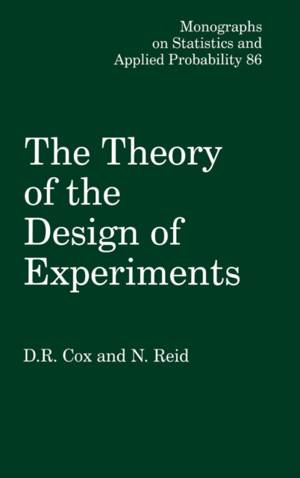
- Retrait gratuit dans votre magasin Club
- 7.000.000 titres dans notre catalogue
- Payer en toute sécurité
- Toujours un magasin près de chez vous
- Retrait gratuit dans votre magasin Club
- 7.000.0000 titres dans notre catalogue
- Payer en toute sécurité
- Toujours un magasin près de chez vous
Description
Why study the theory of experiment design? Although it can be useful to know about special designs for specific purposes, experience suggests that a particular design can rarely be used directly. It needs adaptation to accommodate the circumstances of the experiment. Successful designs depend upon adapting general theoretical principles to the special constraints of individual applications. Written for a general audience of researchers across the range of experimental disciplines, The Theory of the Design of Experiments presents the major topics associated with experiment design, focusing on the key concepts and the statistical structure of those concepts. The authors keep the level of mathematics elementary, for the most part, and downplay methods of data analysis. Their emphasis is firmly on design, but appendices offer self-contained reviews of algebra and some standard methods of analysis. From their development in association with agricultural field trials, through their adaptation to the physical sciences, industry, and medicine, the statistical aspects of the design of experiments have become well refined. In statistics courses of study, however, the design of experiments very often receives much less emphasis than methods of analysis. The Theory of the Design of Experiments fills this potential gap in the education of practicing statisticians, statistics students, and researchers in all fields.
Spécifications
Parties prenantes
- Auteur(s) :
- Editeur:
Contenu
- Nombre de pages :
- 336
- Langue:
- Anglais
- Collection :
Caractéristiques
- EAN:
- 9781584881957
- Date de parution :
- 06-06-00
- Format:
- Livre relié
- Format numérique:
- Genaaid
- Dimensions :
- 155 mm x 237 mm
- Poids :
- 553 g

Les avis
Nous publions uniquement les avis qui respectent les conditions requises. Consultez nos conditions pour les avis.






